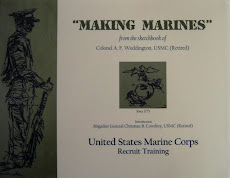by Andy Weddington
Thursday, 13 November 2014
"Who has not served cannot command." John Florio
In response to recent commentary - 'Marine Corps Leadership Explains Crushing Defeat of Obama' - that offered perspective citing the 14 Leadership Traits, readers asked, "What about the 11 Principles?"
Well, the Principles are Part II.
No need to rehash the context set in the aforementioned commentary.
So, on to the Principles...
1. Be technically and tactically proficient. Compromised. A Constitutional lawyer, the President, to his peril (our peril, too), opted to disregard our guiding light - in letter and spirit.
2. Know yourself and seek self-improvement. Compromised. An impossible task when incapable of admitting fault; error; etc. A mindset that runs top down throughout the administration.
3. Know your Marines and look out for their welfare. Compromised. Looking out for 'Number One' is the modus operandi of the administration. All others be damned.
4. Keep your Marines informed. Compromised. More than a few Cabinet members have publicly noted little time with the President. Not only do they not know what's going on they're without direction (or misguided direction) and supervision.
5. Set the example. Compromised. The President and administration has been a textbook example - of what not to do.
6. Ensure the task is understood, supervised and accomplished. Compromised. Remember fielding the Affordable Care Act (Obamacare) website? It's still not right.
7. Train your Marines as a team. Compromised. A more disjointed, dysfunctional administration (government), "team," is unimaginable. Thus finger-pointing is the daily exercise.
8. Make sound and timely decisions. Compromised. No decision is a decision. And makes for bigger problems and more difficult decisions.
9. Develop a sense of responsibility in your subordinates. Compromised. Starting with the President, whom in this administration has accepted responsibility - for anything?
10. Employ your unit in accordance with its capabilities. Compromised. When the right people are not in the right jobs, chaos there is. So flounders America today.
11. Seek responsibility and take responsibility for your actions. Compromised. It's still Bush's (or someone else's fault). And that includes last week's election results.
Sadly, President Obama and his administration have proven again and again the antithesis of fundamental leadership - as based in the time and battle-tested Principles and Traits of U. S. Marines.
Without leadership there is no willing, cheerful followership (embracing trust and faith and confidence) only sworn oath to dutifully obey (lacking enthusiasm and vigor). There is a difference. A big difference.
That is...
With followership the impossible is possible.
With obedience the possible is impossible.
And that about sums up President Obama, his administration, and the state of America and America's influence about the globe today.
For as President Obama said upon his victories, "Elections have consequences."
Yes, they do. And if you don't lead you lose - followers and elections.
The new Congress owes (President Obama nothing) America everything.
With the Principles and Traits a good starting point have they.
A closing thought...
Public and private organizations wonder what it is that makes Marines different. They'd like to bottle the recipe. Or cook up a similar formula. Well, lots of things make Marines different. But two essential elements of fundamental leadership, of which all else stems, come to mind: 1) PT (Physical Training); and 2) PT (Principles Traits).
A Marine leader is out front - period.
Whether NCO, SNCO, officer, or whatever the Marine's rank who's in charge, that means physically and that means morally - in character. You might call it 'fitness for duty.' The elements, PT and PT, are interdependent complements. Failure in either is a failure in leadership. Ask a Marine!
Post Script
http://acoloneloftruth.blogspot.com/2014/11/marine-corps-leadership-explains.html













No comments:
Post a Comment